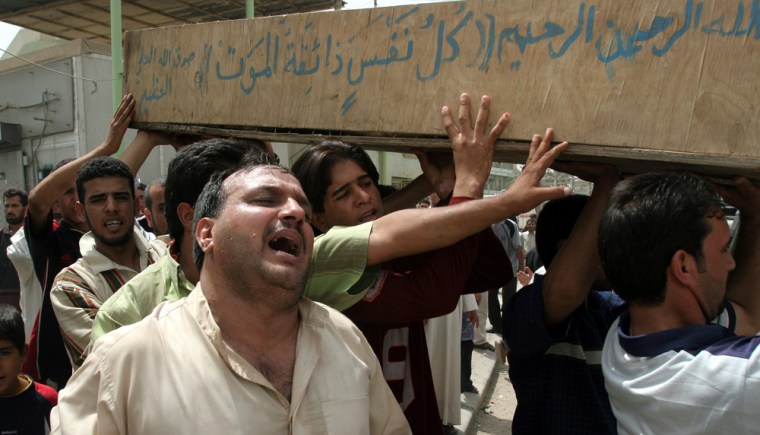Snipers lurking on buildings and in a cemetery sprayed bullets into Shiite Muslim religious processions in the capital Sunday, killing at least 20 people in another spasm of sectarian bloodletting that many Iraqis fear is pushing them toward civil war.
About 300 people were injured, mostly when they fell while running to escape gunfire in Sunni Arab-dominated areas along the parade routes. In one neighborhood, gunmen hid behind tombstones at a Sunni cemetery.
“I was walking and someone got shot in front of me. It wasn’t random fire, it was a clear sniper attack,” said Mohammed Jassim, 32.
He said he could hear the faint crack of shots over the noise of the procession. “People panicked and started yelling: ‘It came from here, no from there.”’
Women in black Islamic robes helped each other while running for cover. Many took refuge under an overpass, flinching and ducking in fear at the sound of each gunshot.
It was relatively quiet elsewhere in Iraq, with eight killings reported in other areas.
Emotional ceremony
The snipings occurred despite heavy security imposed in Baghdad by Iraqi and U.S. forces as well as a weekend driving ban designed to prevent car bombings amid the tit-for-tat violence that Shiites and Sunnis have waged since the Feb. 22 bombing of a Shiite mosque in Samarra.
Still, the day’s main ceremonies went off peacefully at the golden-domed shrine to Imam Moussa Kadhim, one of 12 Shiite Muslim saints.
The attacks on pilgrims took place in three or four neighborhoods at least a mile from the shrine where Kadhim is buried in the Kazimiyah neighborhood of north Baghdad. Shiites believe that Kadhim, who died in A.D. 799, was poisoned in prison by a Sunni caliph.
Pilgrims wearing white shrouds to symbolize their willingness to die for Islam chanted “God bless (Prophet) Muhammad and his descendants” as they converged on the mosque.
“We heed your call, oh Imam!” they proclaimed before entering the compound, beating their chests and flagellating themselves with steel chains in a traditional Shiite expression of grief.
Fadhil al-Sharaa, an aide to Shiite Prime Minister Nouri al-Maliki, estimated a million people participated in the processions. Other officials were more conservative, putting the figure at 200,000 to 300,000.
The Health Ministry and the Interior Ministry gave identical casualty figures in the shootings: 20 pilgrims killed and 304 injured, only a few of the latter by bullets. Police said four militants, including two snipers, were killed by security forces.
The U.S. military confirmed the deaths of five civilians and was checking reports saying a total of about 20 were killed, a spokesman, Lt. Col. Barry Johnson, said.
“Iraqi forces reacted immediately to each reported incident, suppressing attacks and detaining several suspects,” Johnson said.
About 12,000 extra U.S. and Iraqi soldiers have been deployed to Baghdad in recent weeks as part of a security crackdown on a surge of insurgent attacks and sectarian bloodshed in the capital.
Appeals for calm
Many people are especially worried about sectarian violence, which is claiming about 100 lives a day across Iraq and stoking fears that the country could slide into civil war.
Industry Minister Fowzi Hariri dismissed those worries Sunday.
“That’s not happening in Iraq. The vast majority of the people of Iraq are determined to end up in a national unity country and a government that is for the whole of Iraqis,” Hariri said on CNN’s “Late Edition” program.
He said “certain elements” are trying to destabilize Iraq. “But they will not win,” he asserted.
After the attacks, the Iraqi Islamic Party, the main Sunni political bloc, accused government forces and armed Shiite militias of killing “peaceful people,” raiding homes and attacking Sunni mosques, but offered no details.
“We call on the government to adopt a strict stand against anybody who tries to create chaos and disorder,” a party statement said.
Last year’s Kadhim commemoration also was marred by deaths, when rumors of suicide bombers triggered a mass stampede on a bridge across the Tigris River. The government said about 1,000 people died in the worst single day death toll since the U.S.-led invasion in March 2003.
Shiites were prevented from mustering huge crowds at religious ceremonies during Saddam Hussein’s Sunni-dominated regime. But since hiss ouster, Shiite politicians and religious leaders have encouraged huge turnouts as a demonstration of the majority sect’s power.
